On Saturdays, I liked to take the Corydon bus downtown to Portage and Hargrave and spend my allowance at Bookfair. This was in the early eighties when Bookfair was still quite a large store whose front section of used paperbacks half-concealed an enormous showroom of new comics and back-issue bins. What I was there for, though, were the 25-cent bins at the very back of the store: voluminous, neatly-kept, and filled with a surprising abundance of relatively new comics that other kids like me had brought in to exchange for store credit.
Those were the days, huh? Hard to imagine bringing in an old pile of comics to your neighborhood store today and being given a choice of “cash” (30% of their resale value) or “trade” (50% of their resale value, which could be “spent” in the 25-cent bins). Even if you could, they would be dollar bins now, I suppose.
But that was Bookfair in Winnipeg, 1983.
Browsing through those bins was exciting, of course. It was the main way that I tried new things and rediscovered old ones. Swamp Thing. All-Star Squadron. Dazzler. Avengers. Uncanny X-Men. Night Force. Legion of Superheroes. Somerset Holmes. Evangeline. Elric. It’s also where I began “filling in” my first collections: The New Teen Titans, for instance, which I had really only started collecting with issue 21.
The bins were wonderful, but it’s the transactions at the counter that really stay with me. These exchanges of money for comics—or even better, comics for comics—were exciting and intimidating in a way that is difficult to explain adequately from the perspective of adulthood when the act of buying something has become second-nature.
What accounted for this mixture of excitement and nervousness that accompanied these transactions? Perhaps it had something to do with the fact that Bookfair seemed to be run entirely by middle-aged women whose (to me inexplicable) knowledge of comic books (and, it must be said, pornographic magazines) gave them a curiously witchy aspect. The unsettling thing about them was that they were my mother’s age, and yet they had an intimate knowledge of a largely male world that (I imagined) my mother had no interest in, did not approve of, and would hardly have traded in, much less superintended!
These “weird sisters” (as I think of them now) were not friendly and did not smile. And they imbued Bookfair with a kind of sinister glamour that made the store into a sort of pocket universe, a liminal place where the regular rules that governed my life and my sense of the order of things no longer quite applied. This was a place where children’s pleasures brushed up against the scary but coveted world of adult things, and the counter was the site of that fraught but thrilling exchange.
The woman with short grey hair and butterfly-frame glasses is the one I remember best and most fondly. It goes without saying that I never learned her name, but I have a vivid memory of standing at the counter on any number of occasions as she sorted the pile of comics I’d brought to trade. Her face was all business. She separated my stack into comics she was willing to take and comics she would pass on, checking the spines to make sure they weren’t curled or opening a comic to the middle to check the snugness of the staples. I admired the thoroughness of her inspection and held my breath in anticipation of which comics would make the cut.
Sometimes, if most of the comics were good, she’d throw the few rejects back onto the pile and say, “four dollars for the lot.” But that was rare. Usually, when she was satisfied, she’d square the stack of good ones on the counter, count them up, and make a calculation on the small noisy adding-machine that printed receipts on a spool of white paper. Finding out how much you had to spend was almost as much fun as spending it.
Of course, the receipt wasn’t for you, but for the store. The grey-haired woman would remember who you were when you went up to pay. In the meantime, she would write down the value of your trade on a scrap of paper taped to the counter by the cash register—a scrap of paper that contained numerous other (mostly crossed-out) sums. After you’d made your selections from the 25-cent bins, she’d cross out your sum too and everything would balance, even if you had to top up your credit with a few dollars from your allowance. If you had trade dollars left over, you left the store with your pile of new comics and a credit receipt in you pocket for next time.
It was magic, of a kind.
Wednesday, February 28, 2007
On Bookfair: Tales of the DC Decade (Part 2)
Subscribe to:
Post Comments (Atom)




5 comments:
Man, I missed this blog! Excellent post.
Wonderful stuff. That made my day...
Some things never change. Bookfair is still around (albeit in a different location) and they are still as surly as ever. The store gets smaller each time they move (they're now on the south side of Portage between Carlton and Hargrave). And you're right - the bins at the back are now $1.00 instead of 25 cents.
Having said all that, it's still worth a trip next time you're in town. They occasionally have some neat things on sale.
It's been a barren couple of months with you... so what did you think of Spider-Man 3? If there's anyone who could redeem it for me, it's you Jim!
Hey, nobody - it's beyond even my powers to redeem, I'm afraid! (See next post.)
Post a Comment